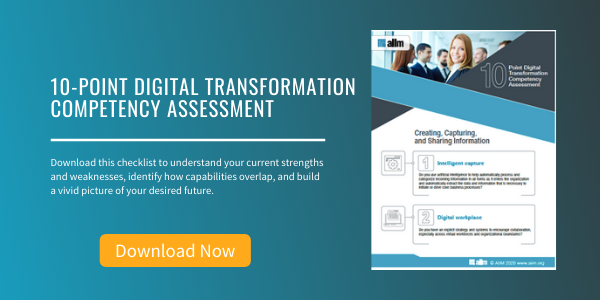
Digital Transformation Means Tackling the Next Generation of Process Problems
Intelligent Information Management (IIM) | Digital Transformation
Digital Transformation requires that organizations meet a new generation of process challenges. Holistic customer journeys that embrace multiple sub-systems and processes, often owned by different departments, require a different way of looking at process problems.
Looking to specific industries, consider some of the following (per Michael Croal from Cornerstone Advisors).
Healthcare:
- Patient Tracking: Admission to Discharge
- Patient Billing: Service/Supply to Bill Satisfaction
- Patient Surgery: Diagnoses to Follow-up
Energy:
- New Production: Land Acquisition to 1st Barrel
- Refining: Raw Material to Final Product
Insurance:
- Claims Adjustment: Initial Contact to Final Resolution
- New Policy: Request for Quote to Renewal
Banking:
- New Customer/New Account: Sale to 1st Anniversary
- Consumer Loan Delivery: Application to Lien Perfection
- Mortgage Loan Delivery: Lead to Investor Sale
- Commercial Loan Delivery: Expression of Interest to Annual Review
- Collections: Past Due to Current
- Loan Servicing: Boarding to Collateral Release
The next generation of business problems require a 360-degree view of information and access to this information – both data and content, in geometrically increasing volumes, and regardless of where it is stored. Organizations can no longer afford to look at data management and content management disciplines in isolation.
While all of the above processes are vastly different, their core characteristics say a lot about why the past bifurcation between data management and content management is becoming blurred and strained.
- BOTH Data and content are needed to solve these problems.
- The scale of the data and content challenge is increasing geometrically and will increase even more rapidly with the internet of things.
- The data and content needed to solve these problems do not reside in a single repository or system but are scattered throughout the organization.
The data and content to solve these problems – assuming you can find it -- in many cases does not inherently contain sufficient metadata to make these information assets either understood or actionable. Traditional ETL (Extract, Transform, Load) approaches focus on bringing big data and content into a common data warehouse. These are proving to be too expensive, too complex, and too slow. Traditional relational/SQL databases are straining to meet big data demands, and new semantic, NoSQL approaches are arising. And the world of content management is being transformed by concepts and disciplines from this new world of data.
About John Mancini
John Mancini is the President of Content Results, LLC and the Past President of AIIM. He is a well-known author, speaker, and advisor on information management, digital transformation and intelligent automation. John is a frequent keynote speaker and author of more than 30 eBooks on a variety of topics. He can be found on Twitter, LinkedIn and Facebook as jmancini77. Recent keynote topics include: The Stairway to Digital Transformation Navigating Disruptive Waters — 4 Things You Need to Know to Build Your Digital Transformation Strategy Getting Ahead of the Digital Transformation Curve Viewing Information Management Through a New Lens Digital Disruption: 6 Strategies to Avoid Being “Blockbustered” Specialties: Keynote speaker and writer on AI, RPA, intelligent Information Management, Intelligent Automation and Digital Transformation. Consensus-building with Boards to create strategic focus, action, and accountability. Extensive public speaking and public relations work Conversant and experienced in major technology issues and trends. Expert on inbound and content marketing, particularly in an association environment and on the Hubspot platform. John is a Phi Beta Kappa graduate of the College of William and Mary, and holds an M.A. in Public Policy from the Woodrow Wilson School at Princeton University.


